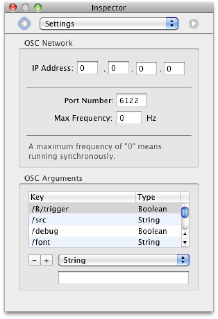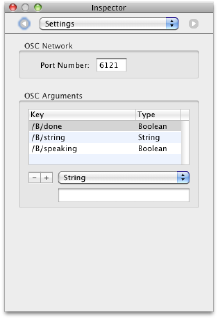| Line 34: | Line 34: | ||
* [http://www.local-guru.net/blog/2009/03/06/osc-events-in-pd OSC-Events] & [http://puredata.info/Members/martinrp/OSCobjects/ OSCObjects] in PD | * [http://www.local-guru.net/blog/2009/03/06/osc-events-in-pd OSC-Events] & [http://puredata.info/Members/martinrp/OSCobjects/ OSCObjects] in PD | ||
* Max/MSP (nativ) | * Max/MSP (nativ) | ||
* [[:Category:Pure Data|Pure Data]] (use the OSC objects from the mrpeach library in Pd-extended, not the OSCx library, | * [[:Category:Pure Data|Pure Data]] (use the OSC objects from the mrpeach library in Pd-extended, not the OSCx library, the later is depreciated and just for legacy purposes included in Pd-extended) | ||
* [http://livecontrol.q3f.org/ableton-liveapi/liveosc/ liveapi] for Ableton LIVE ([http://liveapi.googlecode.com/svn/trunk/src/LiveOSC/OSCAPI.txt Doku]) | * [http://livecontrol.q3f.org/ableton-liveapi/liveosc/ liveapi] for Ableton LIVE ([http://liveapi.googlecode.com/svn/trunk/src/LiveOSC/OSCAPI.txt Doku]) | ||
* [http://www.vvvv.org/tiki-index.php?page=osc vvvv] (nativ) | * [http://www.vvvv.org/tiki-index.php?page=osc vvvv] (nativ) | ||
Revision as of 10:24, 3 May 2010
Open Stuff Control
OSC steht für Open Sound Control (obwohl Open Stuff Control treffender wäre) und ist ein relativ neues Protokoll, das auf dem Netzwerk-UDP aufsetzt. Protokoll meint hier eine Konvention, um den Datenaustausch zwischen Programmen und Geräten zu vereinfachen. Immerhin muss man sich klarmachen, dass MIDI bereits 1983 definiert wurde, was im Computerzeitalter in etwa dem Auftauchen der Dinosaurier entspricht.
Beispiele: Native OSC Unterstützung in Quartz Composer
Vorteile zu MIDI
- freie und komfortablere Adressierung wie z.B. /deviceXY/knobA/ (siehe auch Doku Live-API)
- problemlose Übertragung von Strings und Fließkommazahlen
- nutzt moderne Netzwerkstruktur (W-LAN, Ethernet): lokale oder globale (!) Kommunikation
- statt veralteter serieller Kommunikation (MIDI) mit Maximal-Kabellängen von Haus aus Unterstützung drahtloser Kommunikation
- Unterstützt neueste Geräte (z.B. iPhone Remote Control)
Nachteile zu MIDI
- funktioniert mit dem schnellen, aber verbindungslosen UDP-Protokoll auf, das gerne mal ein paar Datenpakete verliert
- Problematisch, wenn kein W-LAN verfügbar ist
- Bei "kranken" Netzwerken schwierig zu debuggen
- noch wenig unterstützte Hardware (z.B. Synthesizer)
Neutral zu MIDI
- Erlaubt Inter-Appliations-Kommunikation (Nachrichten zwischen verschiedenen Programmen)
- am gleichen Rechner
- auf unterschiedlichen Rechnern
- Viele verfügbare Frameworks und Plugins
Frameworks und Plugins
- Processing: oscP5 (-> How-To
- Quartz Composer (nativ)
- OSC-Events & OSCObjects in PD
- Max/MSP (nativ)
- Pure Data (use the OSC objects from the mrpeach library in Pd-extended, not the OSCx library, the later is depreciated and just for legacy purposes included in Pd-extended)
- liveapi for Ableton LIVE (Doku)
- vvvv (nativ)
- osculator.net - Mac OS X OSC Application (commercial)
- mrmr - Open Source OSC Remote Controller for iPhone
- OSCemote - Open Source iPhone Remote Controller App
- uvm...
Links
Diese Seite ist Teil des Werkmoduls Das Netz: Kybernetischer Raum von Michael Markert für Interface Design / Fakultät Medien an der Bauhaus-Universität Weimar.

